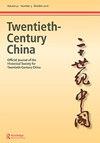The Making of "Evil Tyrant Landlords": A Microhistory of Moralized Class Division during Land Reform in Beijing's Suburbs, 1949
IF 0.4
Q1 HISTORY
引用次数: 0
Abstract
Abstract:Class division represented arguably the most crucial stage of the land reform campaigns mounted by the Chinese Communist Party (CCP), as it not only divided the land but also the political power of rural Chinese society. Based on newly available local archives, this case study of class division during land reform in the suburbs of Beijing argues that the making of "evil tyrant landlords"—and the struggle against them—played a decisive role in conceptualizing the "landlord" as both a figure of Marxist economic exploitation and the morally stigmatized rural elite during land reform and the building of the party-state. After the collapse of the existing rural ruling class, the "struggle against tyrants" movement immediately turned toward enacting formal class division. As a consequence, the discourse of class struggle based on a clear-cut landlord-peasantry dichotomy was, unsurprisingly, allowed by the CCP to infiltrate rural China's post-1949 political culture.“恶暴君地主”的形成:1949年北京郊区土地改革时期道德阶级划分的微观历史
摘要:阶级划分可以说是中国共产党发起的土地改革运动中最关键的阶段,因为它不仅划分了土地,而且划分了中国农村社会的政治权力。基于新获得的当地档案,这个关于北京郊区土地改革期间阶级划分的案例研究认为,“邪恶的暴君地主”的形成——以及与他们的斗争——在将“地主”概念化的过程中发挥了决定性的作用,在土地改革和党国建设期间,“地主”既是马克思主义经济剥削的形象,也是道德上被污名化的农村精英。在现存的农村统治阶级崩溃后,“反暴君”运动立即转向制定正式的阶级划分。因此,毫不奇怪,基于明确的地主-农民二分法的阶级斗争话语被中共允许渗透到1949年后中国农村的政治文化中。
本文章由计算机程序翻译,如有差异,请以英文原文为准。
求助全文
约1分钟内获得全文
求助全文

 求助内容:
求助内容: 应助结果提醒方式:
应助结果提醒方式:


